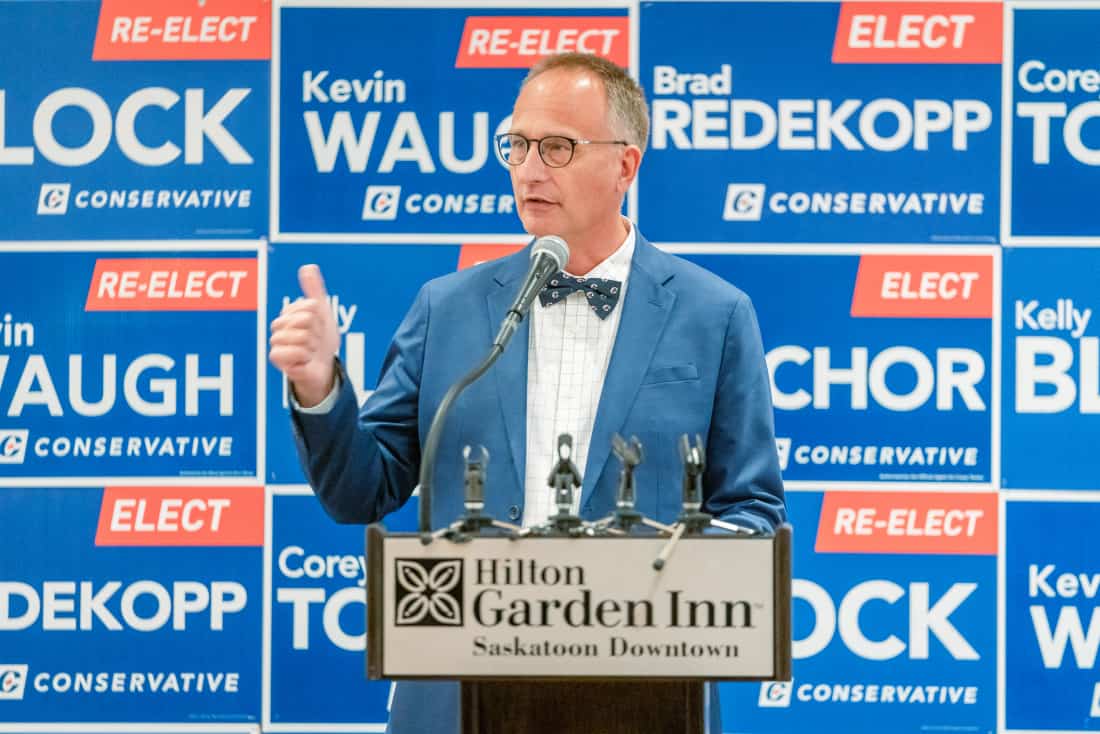
The elections are over and while Canada will have another Liberal government, the prairies have gone conservative.
Oct. 21 marked the 43rd Canadian general election, which saw a Liberal minority government brought into power with only 13 seats shy of a majority. It was a tight race between the Liberals and Conservatives that ended with the Conservative party winning the popular vote.
The results were somewhat dissatisfying for all the parties. The Conservatives won every seat in the province but lost the election nationally; the Liberals formed government but won no seats in Saskatchewan. The New Democratic Party did not win any of the province’s seats either.
At the Conservative election gathering at the Hilton Garden Inn, spirits ran high as they celebrated a completely Conservative Saskatoon. Kelly Block, the Conservative incumbent for Carlton Trail–Eagle Creek, was welcomed with cheers as she thanked the party’s supporters for months of door-knocking leading up to the election.
“While this was not the outcome we were hoping for nationally, I know we have been very successful here in Saskatchewan,” Block said.
But the celebratory crowd still had worries as they saw the Liberal party form a minority government. Kevin Waugh, the Conservative incumbent for Saskatoon–Grasswood, interprets the support for the Conservatives across the prairies as discontent with the policies of the Liberal government, particularly the carbon tax.
“The carbon tax is going to be big. We’ve seen Manitoba, Saskatchewan and Alberta absolutely against the carbon tax,” Waugh said. “This is something that will go forward in the House of Commons; I know the provinces will have a lot to say about the Liberal government.”
Kaitlyn Sauser, a first-year agribusiness student at the Conservative gathering, is concerned for Saskatchewan under another Liberal government but hopeful that things will change in future years.
“It’s exciting but at the same time it’s terrifying because we know that the [minority] government has gone to the Liberals. But it’s good news for Saskatoon because we are all blue now,” Sauser said.
“We just need to keep living… For Saskatchewan, Alberta and Manitoba, it’s going to be terrible but we’ll have to live through it.”
Though the Liberal party celebrated at the federal level, their Saskatoon election gathering at Persephone Theatre was dampened by the local losses.
At the Liberal gathering was Jackson Andrews, a fourth-year political studies student and president of the University of Saskatchewan Young Liberals. He says that to increase support for the party locally in the coming years, he hopes that people will reduce misconceptions regarding the party’s support for the prairies.
“I think a big thing [to] highlight is that the Liberals are not just focused on places like the East and Quebec, and that they really do have a lot to offer to places like Saskatoon,” Andrews said.
However, Andrews is still content with the Liberals’ success in forming government.
“You want it to go well with the local candidates, but you’re proud of what happens at the national level either way,” Andrews said.
Susan Hayton, Liberal party MP candidate for Saskatoon–University, echoes this sentiment. Before the results for the Saskatoon riding were known, Hayton celebrated the Liberal government despite predictions that the city would go all blue.
“I’m very pleased that the Liberal government is continuing on because, of course, I believe in what they’re doing and I have faith that it is great for our country,” Hayton said. “I’m happy and I’m just waiting to see what happens in our city.”
But Saskatoon did not go to the Liberals.
In Hayton’s riding of Saskatoon–University, Corey Tochor was elected MP with 52 per cent of the vote, which is 10 per cent more than what former Conservative MP Brad Trost received in 2015. The increased support for the Conservatives came at the expense of the Liberal candidate.
Claire Card, a University of Saskatchewan faculty member and the New Democratic Party candidate for Saskatoon–University, finished second in the riding again with one per cent fewer votes than her previous run in 2015. At the NDP gathering at the Masonic Lodge, the party’s supporters were disappointed federally and locally.
“We’re disappointed; we thought we’d do better,” Card said.
Logan Huard, a recent U of S alumnus who worked on Card’s campaign, says the party’s results in the election are “not an ideal situation” for the group. Huard is optimistic about seeing more support for the NDP in the future as the party offers people an alternative to austerity policies.
“We live in the University of Saskatchewan riding, and we feel the effects of [austerity] policies every year with the rise in tuition,” Huard said. “I think that our message really resonates with a lot of people, and we just have to keep going and fighting for these things.”
When asked about her plans for future elections, Card says she is not making decisions about running again just yet.
“I’ve got no plans to make any decisions right now,” Card said. “I’m planning to take tomorrow off.”
—
Ana Cristina Camacho/ News Editor
Kienan Ashton
Photo: Heywood Yu